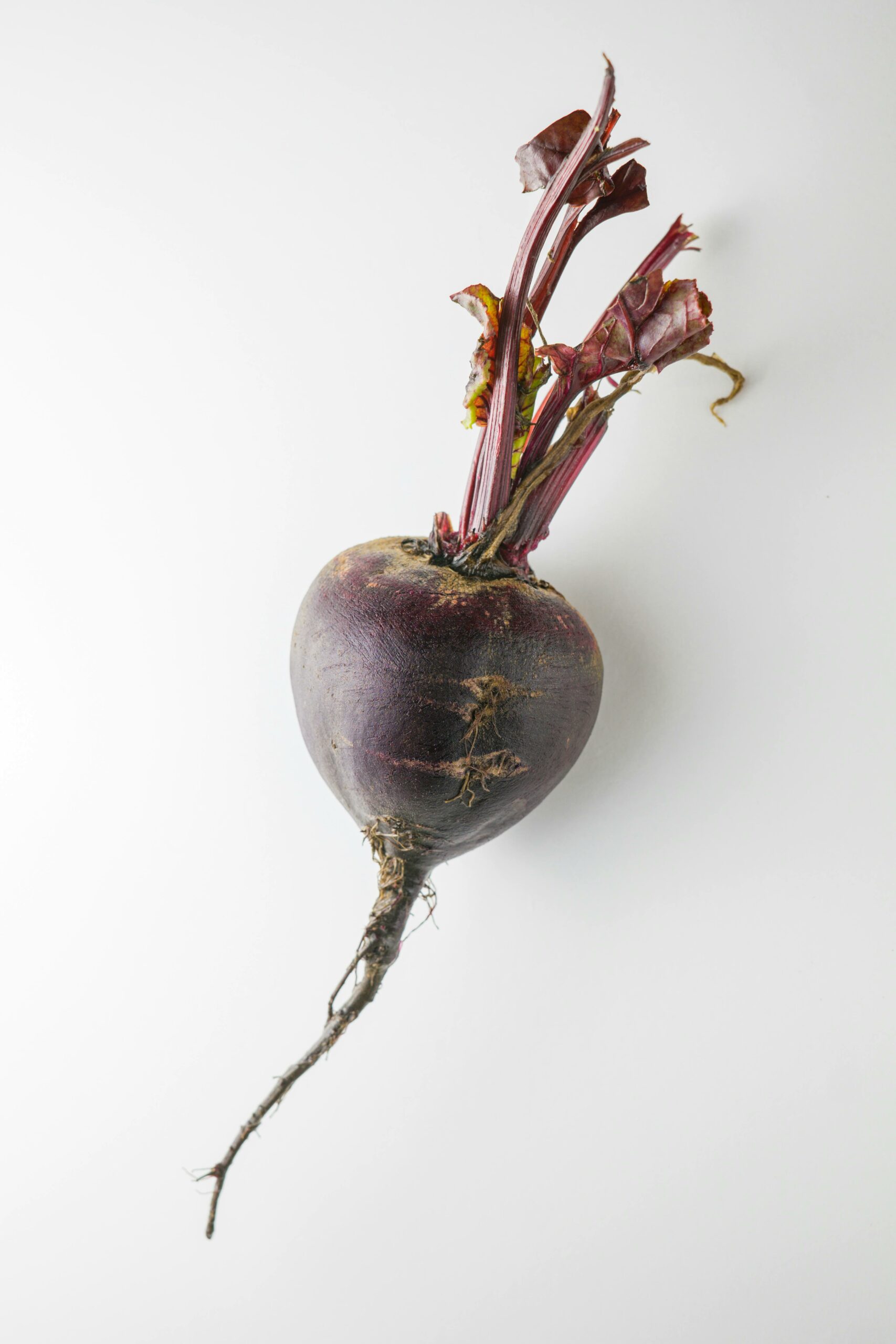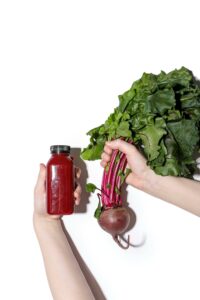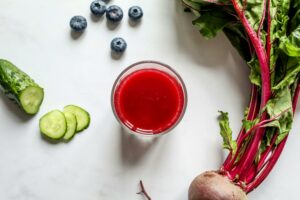The Health Benefits Of Beetroot Explained: Beet It!

You either love ‘em, or you can’t stand ‘em. There’s no middle ground because they have such a distinct and unique flavor. Cilantro, you said? Um, close, but no. I’m talking about beetroot – or beets, as you likely call them if you’re living in North America.
Beets contain a compound known as ‘geosmin’. Geosmin is responsible for its earthy flavor. If you’re a hater, Geosmin is the reason it tastes like you’re eating dirt. If beets aren’t your cup of tea, you probably aren’t eating very many of them – or any at all. But if you can encourage yourself to acquire a taste for beetroot, you’ll be doing yourself a huge service.
The antioxidants, folic acid, potassium and fiber that one receives from eating beetroot is far too beneficial to pass up.
Still not convinced? Read on to discover the amazing qualities of beetroot, and see if your view of this wonderful vegetable changes.
What Is Beetroot? Where Does It Come From?

Beets. Where do they come?
As I said above, this flavorful root is most commonly referred to as simply beets in North America. Other names for it include the table beet, garden beet, golden beet, and red beet.
Traditionally, beetroot has been used for its roots, its plant’s leaves; for salads, for soups, for medicine, for food coloring and even for makeup, acting as a lip and cheek stain. Fun fact, this is how the saying “red as a beet” was coined. It has been recorded that in Greek, Roman and Jewish sources, among others, as a roasted delicacy in the 1800s.
Most beets have a dark red-burgundy color, but there are also white, yellow, and red-and-white varieties available. The cause for the red color we associate with beets is due to a pigment they contain called Betalains, which are powerful antioxidants.
Beetroot serves as a delicious addition to salads, soups, fruit juices, and other foods, increasing their health benefits and adding a unique and strong flavor to any dish.
Beetroot For Diabetes And Blood Pressure Explained
Due to its high sugar content, many diabetics are hesitant to eat beetroot in any form, for fear of unhealthy blood sugar levels. However, this is actually not a valid concern, because beets are medium glycemic index vegetables, meaning that they release their sugar into the blood slowly.
In fact, Betalain and neo-betanin, pigments which are found in beetroot, work to lower glucose levels and increase insulin sensitivity.
So, if you have diabetes and your concern was high blood sugar from beets, fear not! Beetroot for diabetes could actually be helpful, not harmful.
One of the issues associated with diabetes is high blood pressure, which can lead to heart attack, stroke, kidney disease, and chronic heart failure. Nitrates, which are found in beet juice, help widen the blood vessels and allow blood to flow more smoothly.
One study found that drinking just one cup of beetroot juice a day resulted in significantly lower blood pressure and reduced stiffness of the arteries (which often leads to elevated blood pressure). In addition, the antioxidants in beetroot also lower LDL cholesterol levels or “bad” cholesterol levels in your body.
Many people who suffer from diabetes crave sugar but are strapped for healthy sugar options that will not impact their health negatively.
Beets are a great way to satisfy that sugary craving, and it’s not the kind that makes you need more sugar once you eat it, unlike many other unhealthy sugar options.
Beetroot For Detox And Inflammation Explained
We aren’t done with those amazing Betalains yet. Not only do they aid with diabetes, but they help your liver to detoxify your body, as well.
Betalains help to form a substance known as glutathione, an antioxidant that helps your liver and other organs in your body to neutralize toxins and dispel them through waste. Additionally, the fibre in beetroot helps clean out your digestive tract, which ensures regular bowel movement and healthy discharging of waste.
Beets also contain other nutrients which help the liver to detoxify your body, such as betaine (which helps remove toxins from your liver) and pectin (which ensures that toxins expelled from the liver don’t find their way back into your body).
Beetroot is also a guard against unhealthy inflammation. Your body needs magnesium to help it absorb calcium. If you are not getting enough magnesium in your diet, the calcium in your body can build up to unhealthy proportions which can cause inflammation.
Beets are a natural source of magnesium, helping your body to process the calcium you ingest and keep inflammation at bay. The Betaine in beetroot also aids against inflammation, since it keeps cyclo-oxygenase enzymes activity under control – enzymes which trigger inflammation.
Betalain and vulgaxanthin, nutrients found in beetroot, are also believed to help against inflammation. When it’s under control, inflammation is a natural reaction and is a positive thing, as it protects your body against viruses and injuries. However, in order to keep inflammation under control and prevent it from causing harm, it’s important to include anti-inflammatory foods in your diet.
Beetroot Juice Explained

Beetroot Juice is a very popular ingredient in smoothies.
It’s a lot easier to down a quick drink in the morning rush than to sit down and cut up a salad. That’s where the benefits of beet juice over regular beets comes in – it’s quick, easy, and, if you haven’t yet acquired a taste for beets, it can be blended together with other fruits and vegetables, like apples and carrots, to mask the strong taste and make it more palatable.
- Physical Stamina; Beetroot juice can offer a great energy boost! A study showed that cyclists who drank two cups of beetroot juice every day had increased physical stamina and were able to perform better than they had before.
- Blood Pressure; When you drink beet juice, your body changes the nitrates found in beets into nitric oxide, which helps to lower your blood pressure.
- Blood Sugar; The betaines in beetroot juice can lower blood glucose levels.
- Dementia/ Alzheimer’s; Nitrates can also assist with blood flow to the brain and thereby slow down the progression of diseases like Dementia/Alzheimer’s disease.
Beetroot Juice Side Effects Explained

Side Effects of Beetroot.
While beets pack in loads of benefits, there are a few side effects you should be aware of before consumption.
- Beeturia; Or changes in urine color. Although not dangerous, it can be alarming to notice bright red urine, but it isn’t blood – it’s dye! This dye comes as a result of the betalains from the beet juice you drank earlier. However, since this is more common in people with iron deficiency, you might want to get your iron levels checked out if you commonly see this symptom after drinking beet juice.
- You may also experience this red color in your stool, but make sure to take note if you do. If your stool or urine is red even after 48 hours since consuming beet juice, it could be blood, and therefore dangerous, and should be discussed with your doctor.
- Kidney stones; the oxalate in beetroot is responsible for this one since it can combine with calcium and cause a stone. If you’re prone to kidney stones or have problems with your kidneys, you might want to check with your doctor about including beets in your diet. It may be best for you to steer clear of them.
- Allergic Reaction; People who are allergic to beets can suffer from reactions such as the following:
- Rashes; Allergic reactions to beetroot consumption can include rashes. With certain people, it can even go as far as people complaining of constriction of their vocal cords.
- Hives; Hives can show up alongside rashes and red itchiness. Those who do suffer from any of these reactions should consult a doctor. Although, most of the side effects are uncommon. When they do occur, it is usually due to an over-consumption of beets and beetroot juice itself.
- Itchiness; Along-side rashes and hives, the skin can become itchy and red. The itchiness may appear in and around the throat area or a patch of skin on the body may become itchy and red. Again like hives and rashes, this is in extreme cases and may relate to allergies. If symptoms persist, seek a physician.
- Chills And Fever; In cases of detoxification and cleansing one may experience temporary symptoms such as low fever or chills. One possible explanation as to why beet juice may create this side effect is because it improves cellular respiration whereby cells are better capable of releasing stored waste. If this is so, many cells release waste at once. It can then cause slight flu-like symptoms. Either way, if fever persists, again seek your local physician.
- Vocal Cord Problems; Although this is a rare side effect, some people do experience tightness in their throat or difficulty speaking as a side effect of drinking too much beet juice.
- Dangerously Low Blood Pressure; Although a lower blood pressure is generally a good thing, too low can be unsafe. If you know your blood pressure is already too low, or if you are taking medication to lower your blood pressure, it may be better for you to avoid beets and beet juice.
- Stomach Upset; You may have to introduce beet juice into your diet slowly, especially if you have a sensitive stomach. Some people have reported cramps, constipation, bloating, diarrhea, and vomiting. These can come as a result of your body being un-used to high levels of nitrates, allergic reaction, or consuming too many beets. Beets can even exacerbate preexisting gastrointestinal issues, so consume with caution.
- Elevated Blood Sugar Levels; If you have very high blood sugar levels, it’s best to consult with your doctor about beetroot consumption. Beetroot has high sugar content and may not be for everyone.
- Pregnancy; If you are pregnant, you have to be careful about what you eat, for both your own health and your baby’s. Consult with your doctor about how much beetroot or beet juice you can have safely during pregnancy.
- Danger To The Liver; Since beets contain metals like iron, copper, phosphorus and magnesium, consuming them in excessive amounts could cause damage to the liver.
Beetroot Capsules Explained
For all you beetroot-haters out there, this one’s for you. People who find it difficult to include beets in their diet have the option of beetroot capsules. Capsules are easier to eat than a whole vegetable. Take them with liquid, such as juice, to mask the taste if desired. The health benefits of beet capsules are exactly the same as those of the vegetable, so you aren’t losing out on anything by taking the root in tablet form.
They also tend to have a longer shelf life than fresh beets. If you decide to take beetroot capsules, speak to your doctor about how many you should be taking and when. So, there’s really no excuse now. Even if you can’t think of a way to incorporate beets into your diet, you can still reap their benefits. A quick pill or two and you’re good to go!
Conclusion
As beetroots do have some strong compounds, it might be best to work beets into your diet with care. But once you do, you’ll be able to access all the tremendous benefits found in this incredible root vegetable. Our bodies are miracles, no denying that!
However, we need to keep them healthy and do the best we can to promote optimal functioning. Eating beets does so much for your health, that it’s almost a must to include them in your diet! Honestly, it’s no wonder that so many have started referring to them as a “superfood” these days.



